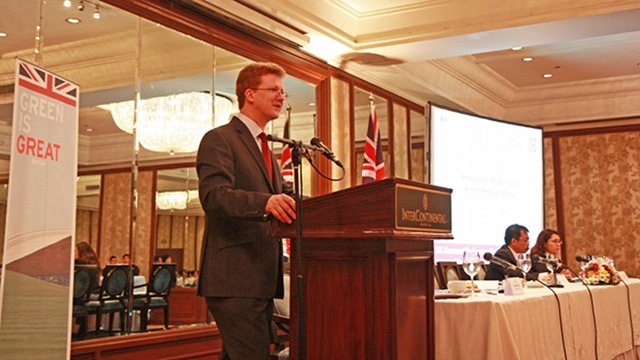SUMMARY
This is AI generated summarization, which may have errors. For context, always refer to the full article.

MANILA, Philippines (UPDATED) – The 40% limit on foreign ownership in the renewable energy sector is “unhelpful” in attracting investors, stressed British Ambassador to the Philippines Stephen Lillie.
Speaking on the sidelines of the UK Renewable Energy Business Seminar on Tuesday, February 19, Lillie called on the Philippine government to adjust the foreign ownership limit set by the 1987 Philippine Constitution.
“I think that the government is well-aware that the 60-40 limit is unhelpful in a whole range of sectors,” he said, echoing the concern that various business groups have already raised.
“The British Chamber of Commerce and the Foreign Chambers collectively raised, as always, one of the issues: ‘Can the 60/40 limit be adjusted?’ I think the Philippine government is well-aware of that view,” he said.
The Philippines currently limits foreign ownership in public utilities to 40%, while Filipino investors take in the remaining 60%.
Renewable energy
The British envoy called on the Philippine government to relax its foreign equity cap since this disallows investors in contributing some to the forecasted higher demand for power in the country.
“There’s a lot of opportunities in the renewable energy sector here. You have a lot of wind potential, you have a biomass potential and British companies have a lot of expertise in the technology. Unfortunately, there are limitations in the Philippine law that complicate investments here such as the 40% equity cap,” said Lillie.
He said renewable energy is the driver of a “21st century industrial revolution” and that Philippines is blessed with resources that makes it “well-placed to lead in the renewable energy industrial revolution.”
Energy Director Mario Marasigan who delivered a speech on behalf of Energy Secretary Carlos Jericho Petilla, welcomed the interested investors.
“Your participation here is vital… your presence here… positions you for crucial roles in the development of the Philippine Renewable Energy landscape, and we need you,” he said.
“We are hoping for the participation of the foreign investors because local developers are engaged in small and big projects and there are opportunities for them to join hands,” said Marasigan who is also the director of Renewable Energy Management.
According to Marasigan, prior to the Renewable Energy Law, there were very limited participants in the sector with most of the projects being initiated by the government itself either through the state-owned National Power Corporation (Napocor) or Philippine National Oil Company (PNOC).
“After the law we saw hundreds of new developers coming in particularly for the small projects. Foreign investors can come in at sectors that we need additional investment for,” he said.
British delegation
International investors look towards the Philippines to invest, noted Lillie. A delegation of British companies gathered on February 19 to discuss investment opportunities in the sector
The UK already has been investing the country’s clean technology industry. Out of the Philippines $250 million clean technology fund, 13% is funded by the UK.
Lillie said the world market for renewable energy is growing strongly, as over 118 countries already have targets in place.
The UK isn’t the only international party that has interested in investing in this sector. In January, 8 German companies engaged in renewable energy industry travelled to Manila to seek partnerships with local companies for the establishment of bioenergy production facilities.
Several private sector players have already stepped up their involvement in the geothermal energy segment, including Philippines-based Basic Energy Corporation, which plans to invest $1 billion in geothermal projects once a partnership with a Chinese corporation is secured. – Rappler.com
Add a comment
How does this make you feel?
There are no comments yet. Add your comment to start the conversation.